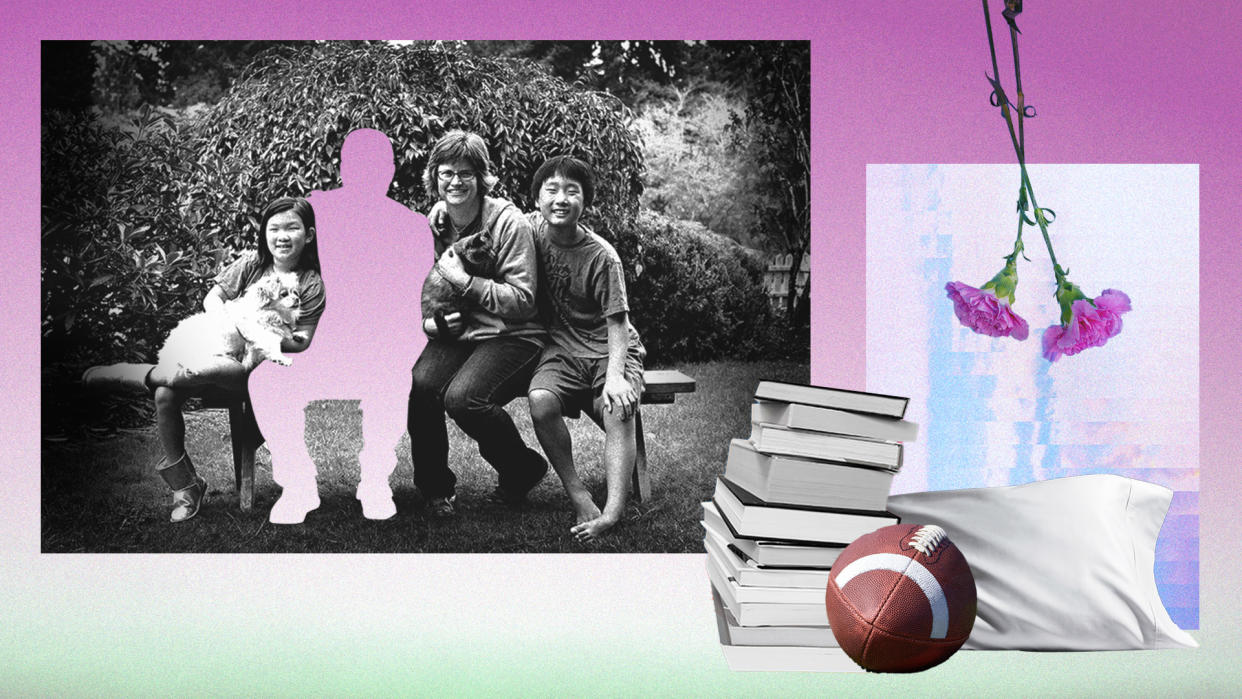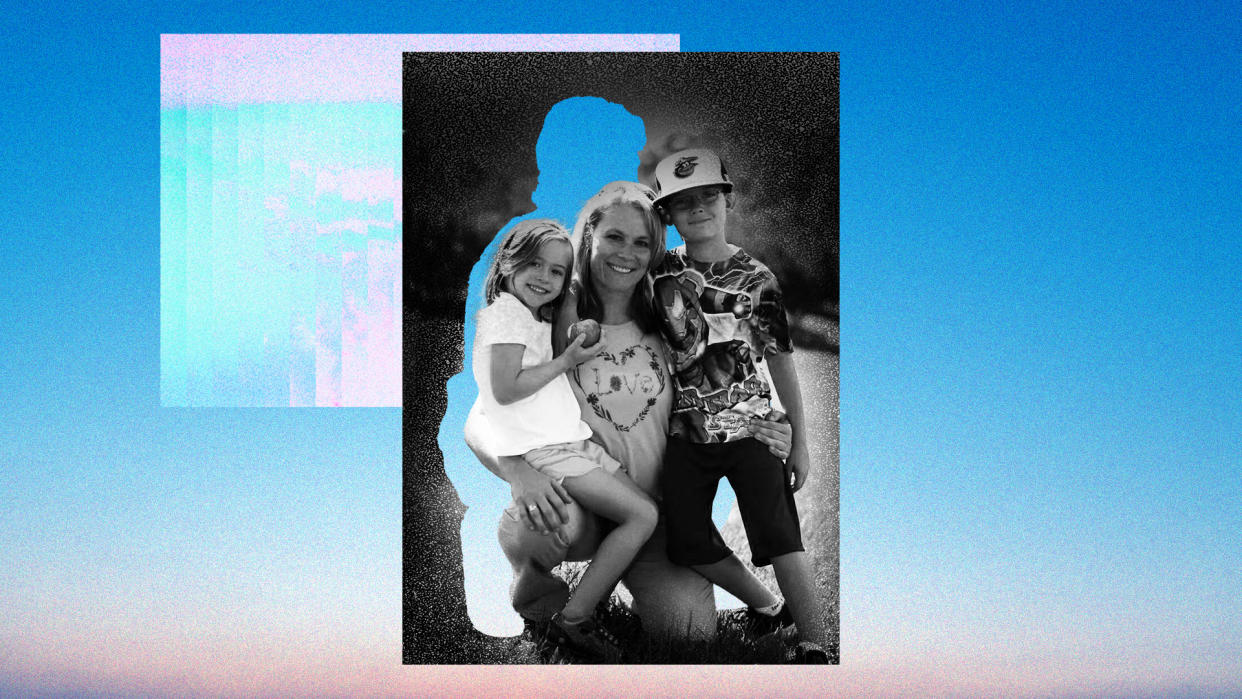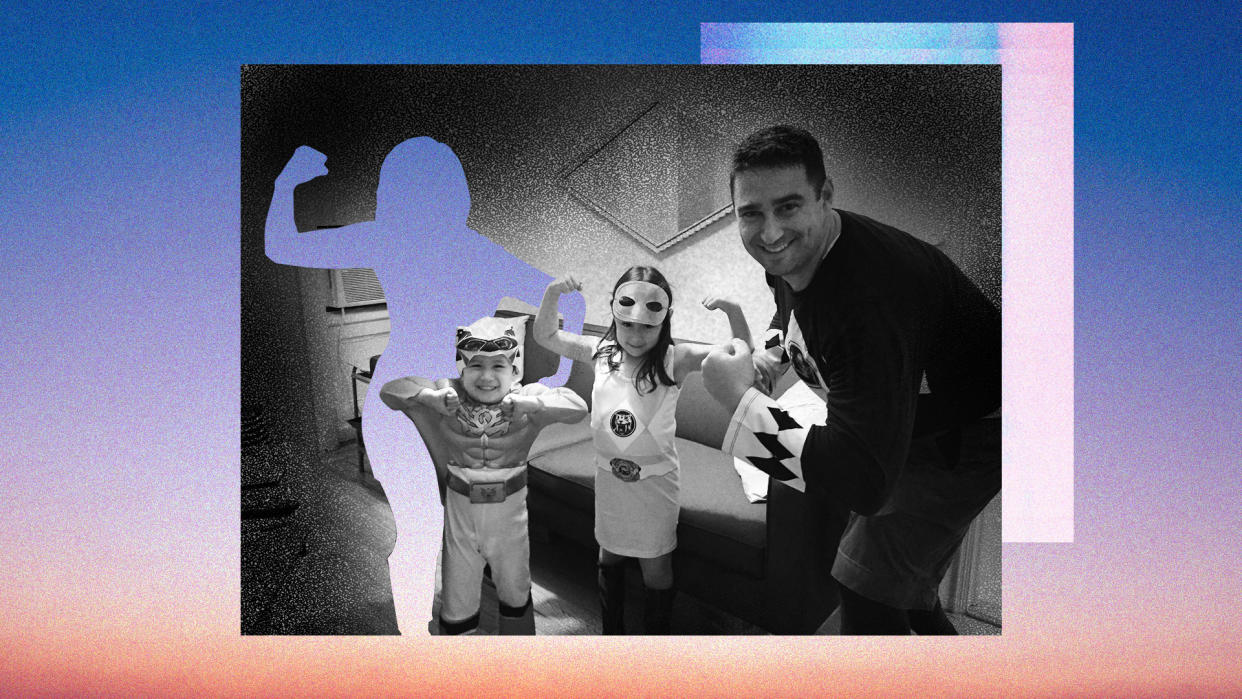These parents were grieving the loss of spouses while also holding it together for their kids. Here’s how they did it.

When Jenny Lisk's husband Dennis died of brain cancer in 2016, the mom of two struggled to care for their children, 9 and 11, while managing her own grief.
"Grieving while also parenting grieving kids is hard," she tells Yahoo Life.
In fact, says Lisk, who authored a book, Future Widow, about her experience, "I found the parenting part to be the hardest."
Dealing with her own grief wasn't easy, the Seattle-based mom adds. But, "I found resources and a great therapist and books, and I could see that there could be a path forward. In terms of my new job of widowed parent — a job a didn't ask for, and never expected — I didn't see the path forward."
Lisk and her kids were not alone: Census data shows that about 41.5 million American adults identified as a widow in 2021; in 2022, about 60,000 children under the age of 6 lived with a single widowed mom while 21,000 lived with a single widowed father.
But learning to parent through grief can feel lonely when kids — one in 12 of whom, in this country, experience the death of a parent or sibling by age 18, according to the Centers for Disease Control and Prevention — are looking to you for guidance.
"You need help logistically and on the emotional side," Thea Gallagher, a clinical assistant professor of psychology at NYU Langone Health and co-host of the Mind in View podcast, tells Yahoo Life. "Your bandwidth is extremely limited at the same time. It's a lot."
Unfortunately, plenty of other people have been through this journey — and made it work to the best of their abilities. Here's what they learned.
Accept help
Kate Hayden's husband Danny died in 2011 at age 32 after struggling with addiction. Their children were just 2 and 5 at the time. "I was numb for a really long time," the Maryland nurse tells Yahoo Life. "But I had family around, and I was surrounded by people all the time. That helped a lot."

She says she had a babysitter who "did anything and everything I needed for those children," including having them sleep at her place when Hayden worked night shifts. Her father helped pay her rent "until I was able to do that for myself," and she "found a sense of normalcy" by going to family football-watching gatherings with her children on Sunday afternoons.
Danny's mother and sister also supported Hayden. "They never turned their back on me," she says, noting that if she "ever needed a break, I had someone to call. That was so important."
She had to learn that "they don't just offer it to offer it. They genuinely want to help."
Maura Duffy tells Yahoo Life that she also had a lot of friends and family step up after her husband Marty died of a heart attack, leaving her with their kids, 10 and 12, in 2019. "That helped a lot," she says. "My brother kept insisting that I get a good night’s sleep. My children slept with me for a while after Marty died. And we just dragged ourselves through what we had to do."
Advises Gallagher: "Whether it's family, friends or outsourcing some things in your life that you can, it's important to get help. Your responsibilities may have just multiplied."
Give yourself grace
Duffy, of New York, says she "just did the best I could do" after the sudden loss of her husband. "My children are wonderful and understood that we were all going through a difficult time, so there was a lot of grace and kindness," she says, adding that she felt she had "no choice but to hold it together for my children."
Not that it's easy. Hayden says she started going out with friends and drinking at one point, "which was not healthy and not a good choice." Her brother eventually confronted her and, she says, "I got myself together."
But at first, she recalls, "I was just miserable. I kept thinking, I can't believe this happened. I was so angry at him. But, once I got myself together, I was just able to talk about it with people." Joining group fitness classes, she adds, "was a much healthier choice for me, and the community at the gym was amazing."
Lisk had to work through disturbing flashbacks of her husband's illness after he died.
"I'd be sitting in my home office, less than 10 feet away from Dennis's urn, and having flashbacks when I was supposed to be focusing on work," she says. "It was hard to focus when my mind kept going to them."
Don't neglect yourself
Craig Stolzberg, of New York City, lost his wife Julie in 2016. "She was diagnosed with stage four colon cancer four days after our youngest was born," he tells Yahoo Life. When she died, just over five years later, he says he "went into survival mode."

"Immediately, we were on spring break from school," he says of himself and his kids, 5 and 7 at the time. "We flew to Florida and stayed with some friends to get away from the craziness for that short period of time." But they spent the end of the trip alone, as a family. "I wanted it to just be the three of use, to prove to myself that I could do this, that we would be fine," he says.
Back home, he worked on finding a new rhythm. The family had a "manny," plus friends in their building, to help with the kids. And at first, he though he was "doing a great job emotionally." But looking back, he admits, "I don't think I took care of myself as much as I should have. Physically, I wasn't working out. Mentally, I didn't talk to friends or family about my feelings. I dove deeply into my kids and focused on them and deflected everything else."
Overall, he says he was, "for better and for worse, ignoring myself — just passing by."
Now, "I still find myself spiraling into, 'Everything I do has to be for my kids or my work,'" he says. "But I try to do something for myself … to get out of that mode. I realize that it's not healthy for me, or my kids."
Consider professional help
Experts stress the importance of giving your kids an outlet — besides the surviving parent — to talk about their grief. Lisk's children saw a grief counselor and Hayden says she's had both of her children see a therapist about the loss of their father.
And while not every child needs therapy, it can be helpful for many, Melissa Santos, pediatric psychologist at Connecticut Children's, tells Yahoo Life. "The concept of a safe space or a neutral party to help process grief, particularly in families that may be having a hard time, is important," she says. "However, the timing of that, the need for that and what that looks like will vary per child and family."
In some parts of the country, summer bereavement camps provide space for children and teens to process their loss among peers who understand — like Camp Erin and Camp Experience, both with various locations, Comfort Zone Camp in Virginia, and New York's Camp Good Mourning and Camp Good Grief, both free.
"Kids who are grieving feel so different and alone," Camp Good Grief director Angela Byrns tells Yahoo Life, adding that they "can sense that people are uncomfortable with the topic of death and dying." In a space with kids who have been through it, she says, "they don't have to worry about how other people will feel about it. They just know that these people get it."
Communicate openly
Hayden talked to her children a lot about their father's death, and was advised by the school guidance counselor to be direct about what happened. "She said, 'You don't want to sugarcoat it,'" she recalls.
Now, she shares good memories about their dad. "I try to talk to the kids about how good of a person he was when he wasn't drinking, and how proud he would be of them," she says.
Lisk says she's learned the importance of transparency. "If a kid is old enough to ask a question, they're old enough to hear an honest answer," she says. "It's OK not to have all the answers. If a question is unanswerable, such as, 'Why did Dad have to die?', you can connect with your child around the emotion behind the question. You could talk about Dad, ask them what they miss about him."
Byrnes says it's particularly important for parents to share their grief with children.
"My first question to parents is, 'How are you grieving, and how are you sharing that grief with them?'" she says. "Everyone in the family is going to grieve differently, but there are portions of it that can certainly be done together."
Understand that grief will change — on your own timeline
"Other people’s response to my grieving process has been difficult," Duffy says. "Especially because some of the people who you assume will be there for you during the day to day unfortunately aren’t. That takes some time to get used to."
She adds that, contrary to what many want to believe, "There is really no 'moving on'; the grief does not go away. It morphs into something different that you have to learn to live with."
Hayden has found comfort, and a way to melt her anger into compassion, through Al-Anon meetings and counseling. "But it still makes me angry, to this day, that he's not here to see his children grow up," she says.
Stoltzberg isn't sure his grief has changed at all in seven years. "I've learned a lot from it," he says. "It's changed the way I do everything … But it still hurts. It's still there, and it's always going to be there. I've accepted that … It's a piece of me."
Lisk says she's learned that "some things will never change" after losing her husband: "It's impossible to get out three plates for dinner," she says, "and not think there should be four."
Wellness, parenting, body image and more: Get to know the who behind the hoo with Yahoo Life's newsletter. Sign up here.
